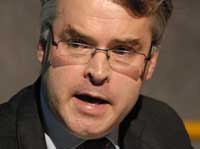
Children’s minister Tim Loughton is considering whether “highly contentious” adoption cases should be investigated by a government-appointed ombudsman, Community Care can reveal.
As the government launched updated guidance designed to improve adoption rates for children in care, Loughton told Community Care he was also concerned about any case where a child is wrongly removed from its parents and placed for adoption.
Loughton said he was aware of a minority of “very questionable judgements” made by courts, before revealing that he is contemplating “some sort of ombudsman system” to investigate highly contentious cases, in the hope of finding solutions.
“There is a lot of work to do to make sure we have more adopters and swifter, better quality adoption placements, but there is also work needed to make sure that the small number of cases which go horribly wrong, and are difficult to justify, are tackled as well so that people feel the adoption system is doing the right thing for children,” he said.
Currently there is no such inspection framework for family law cases, but Community Care understands the changes could be considered as part of wider family court reforms the government is looking to make, through the ongoing Family Justice Review.
Loughton also hit out at the family courts system for being “too process-driven”, which, he said, was leading to delays in decision-making for children.
“I think the courts are too process-driven. There are some cases where very clearly there is no way back to a child’s birth parents and the child is a strong candidate for adoption. Do we need to go through quite as many processes for that child as for another where it is not such a clear cut decision? I think we can use a more proportionate approach in many cases.”
Loughton said he is trying to encourage local judges and adoption panels to discuss areas of “huge disconnect” before any new guidance for the family courts is contemplated.
“Whenever I speak to adoption services and adoption panels they say their job is being made harder because of court processes and delays: in getting the hearing; in the fact that judges are always asking for that extra expert witness statement and so forth.
“Then I speak to judges and they say adoption panels are taking so long to process paperwork, hold meetings and bring cases back to court. There just seems to be a huge disconnect at the moment.”
“If we have better communication we might find that we can streamline the system better before we have to bring in any new guidance. We’ve got to make sure that both sides, judges and adoption panels and social workers, are talking to each other. Then we can look at ways to make adoption panels more effective and ways that judges can do their job more effectively.”
Loughton said he hoped the family justice review, due to publish its interim report at the end of March, would provide “strong steers and advice” and lead to “greater transparency in the family courts”.
What do you think? Join the debate on CareSpace
Keep up to date with the latest developments in social care. Sign up to our daily and weekly emails
Related articles
Loughton casts doubt on Ofsted adoption inspections
Loughton: Adoption hindered by political correctness
Children’s minister condemns Telegraph adoption campaign
Inform subscribers: Achieving stability for children who are looked after or adopted


 Bournemouth, Christchurch and Poole
Bournemouth, Christchurch and Poole  Hampshire County Council
Hampshire County Council  Lincolnshire County Council
Lincolnshire County Council  Norfolk County Council
Norfolk County Council  Northamptonshire Children’s Trust
Northamptonshire Children’s Trust  South Gloucestershire Council
South Gloucestershire Council  Wiltshire Council
Wiltshire Council  Wokingham Borough Council
Wokingham Borough Council  Children and young people with SEND are ‘valued and prioritised’ in Wiltshire, find inspectors
Children and young people with SEND are ‘valued and prioritised’ in Wiltshire, find inspectors  How specialist refugee teams benefit young people and social workers
How specialist refugee teams benefit young people and social workers  Podcast: returning to social work after becoming a first-time parent
Podcast: returning to social work after becoming a first-time parent  Podcast: would you work for an inadequate-rated service?
Podcast: would you work for an inadequate-rated service?  Family help: one local authority’s experience of the model
Family help: one local authority’s experience of the model  Workforce Insights – showcasing a selection of the sector’s top recruiters
Workforce Insights – showcasing a selection of the sector’s top recruiters 

 Facebook
Facebook X
X LinkedIn
LinkedIn Instagram
Instagram
Comments are closed.